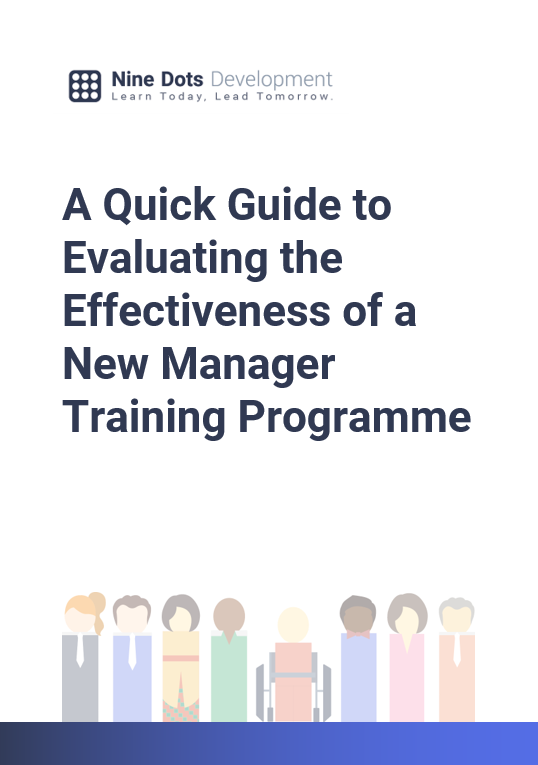Wednesday 31 May 2023 Article
The TakeawayHow to Set Your New Managers Up for Success with the Right Training Programme
How to Overcome the Trials and Tribulations of First-time Management
Part 7
#Leadership #Management #HighQualityTraining #StepByStep #EffectiveTraining #StaffDevelopment #Upskilling #HowTo
The perfectly matched resource for this article...
A Quick Guide to Evaluating the Effectiveness of a New Manager Training Programme
This guide focuses on helping you evaluate the effectiveness of a new manager training proramme, but can also be applied to other training programmes.
Download!Playing catchup?
How to Set Your New Managers Up for Success with the Right Training Programme
Developing new managers is crucial for organisations to foster leadership, drive team performance, and achieve business objectives. Choosing the right training programme is essential to equip them with the necessary skills and knowledge to excel in their roles. However, with the abundance of options available, it can be challenging for organisations to make the best selection. In this article, we will outline five key steps that organisations can follow to find the right training programme for their new managers, ensuring optimal professional development and long-term success.
Step 1: Assess Training Needs and Objectives
The first step in finding the right training programme for your new managers is to assess the organisation's training needs and objectives. Identify the specific skills and competencies required for effective managerial performance within your organisation. Consider areas such as communication, leadership, problem-solving, and team management and determine the desired outcomes of the training programme, whether it is to enhance leadership capabilities, improve team collaboration, or drive strategic decision-making. By having a clear understanding of the training needs and objectives, organisations can align them with the most suitable training programmes available.

Step 2: Research Training Providers
Once the training needs and objectives are defined, conduct thorough research on training providers that offer programmes specifically designed for new managers. Look for providers with a strong reputation, proven expertise in managerial development, and experience in delivering training for new managers. Consider factors such as the provider's industry knowledge, track record of success, and customer reviews or testimonials. Additionally, examine the provider's approach to training, methodologies used, and the relevance of their content to your organisation's goals. In our previous article, we highlighted the best practices for choosing the right training provider.
Step 3: Evaluate Training Programme Content and Structure
Next, evaluate the content and structure of the training programmes offered. Assess the comprehensiveness of the programme, ensuring it covers key areas essential for new managers' success, such as leadership development, effective communication, conflict resolution, and performance management. Consider the programme's delivery format, whether it is in-person, virtual, or a combination of both (blended learning). It is essential that the training program incorporates a mix of theoretical knowledge, practical application, and interactive activities to maximise learning and engagement.

Step 4: Consider Customisation and Flexibility
Every organisation is unique, with its own culture, values, and specific requirements. Consider training providers that offer customisation options to tailor the programme to your organisation's needs. Customisation could include incorporating industry-specific examples, case studies, or exercises that reflect your organisation's challenges and realities. Additionally, assess the flexibility of the training programme. Determine whether the program can be customised further to address specific managerial development needs within your organisation. Flexibility in terms of scheduling, duration, and delivery methods can also be advantageous, allowing new managers to balance their training with their day-to-day responsibilities.
Step 5: Seek Feedback and Evaluate Return on Investment
Before making a final decision, seek feedback from organisations or individuals who have previously participated in the training programme. Additionally, it’s a good idea to evaluate the potential return on investment (ROI) of the training programme - consider factors such as cost-effectiveness, long-term benefits, and the value it brings to the organisation. While cost is an important consideration, it should not be the sole determining factor. Focus on the quality, relevance, and impact of the training programme to ensure it aligns with your organisation's goals and delivers tangible results.
Conclusion
Selecting the right training programme for new managers is a critical decision that can significantly impact their development and the overall success of the organisation. By following these five steps, organisations can make an informed decision that aligns with their specific requirements. If you are currently looking for training for your new managers, have you seen our:
A Quick Guide to Evaluating the Effectiveness of a New Manager Training Programme
This guide focuses on helping you evaluate the effectiveness of a new manager training proramme, but can also be applied to other training programmes.
Download!Missed an article?
More from How to Overcome the Trials and Tribulations of First-time Management
